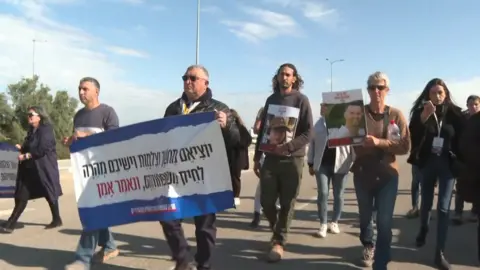Kerem Shalom crossing: Israeli protesters hold up aid trucks to Gaza
 BBC
BBCHundreds of Israeli protesters have blocked some humanitarian aid trucks from entering Gaza for a third day.
Demonstrators, including families of hostages still held in Gaza, waved Israeli flags at a key crossing and chanted against "aiding the enemy".
The protesters say they are demanding no aid for Gaza until all of the hostages are released.
This comes despite a US demand that aid to civilians in Gaza be allowed to enter "without interruption".
For a third consecutive day, the protesters descended on the Kerem Shalom border crossing between Israel and Gaza to try to block humanitarian aid from entering the enclave.
A queue of trucks carrying aid supplies, some of them flying Egyptian flags, idled for hours at the crossing as the protesters urged the government to stop aid supplies until the remaining captives held by Hamas are freed.
The UN Office for the Co-ordination of Humanitarian Affairs (OCHA), said that on Wednesday - the first day of the protests - only nine trucks were able to cross at Kerem Shalom, while 114 were diverted to the Rafah crossing in Egypt.
The UN said that only 153 trucks had entered Gaza on Wednesday, which was well below what had been able to enter in recent weeks.
The Israeli government is facing growing international pressure to allow more humanitarian relief into Gaza, combined with intense domestic pressure to secure the release of the hostages.
The protesters say they view the delivery of aid to Gaza while their loved ones are still being held by Hamas as "a moral failure".
They say they fear the aid could end up in the group's hands.
Israeli media report that although some of the protesters are related to hostages, others are the parents of IDF soldiers currently deployed in Gaza, with another group representing right-wing activists who promote a return of Jewish settlements to Gaza.
The demonstration took place amid unconfirmed reports that Israeli and American officials will hold "critical" hostage talks with Qatari and Egyptian mediators in Europe in the coming days.
The reports suggest that the director of the US Central Intelligence Agency, William Burns, and the Mossad chief, David Barnea, will meet Qatar's Prime Minister and Foreign Minister, Sheikh Mohammed bin Abdulrahman al-Thani, to discuss the release of more than 100 Israeli hostages and a pause in fighting in Gaza.
The White House has described the talks as "sober" and "serious" efforts, involving players who were key to sealing a previous agreement in November.
But Hamas continues to insist on a full ceasefire and withdrawal of Israeli troops from Gaza.
A senior Palestinian official has told the BBC that mediators have proposed the phased release of Israeli hostages in exchange for a renewable ceasefire, the release of Palestinian prisoners and an increase in aid.
Meanwhile, heavy fighting has continued in Gaza. Israeli military officials say warplanes have carried out dozens of raids on several Hamas targets around Khan Younis during the night.
The Hamas-run health ministry says Israeli attacks in the past 24 hours have killed 183 people and injured nearly 400 others.
Israel launched its military campaign with the declared aim of destroying Hamas after its gunmen killed 1,200 people - mostly civilians - and took about 250 others hostage, in the unprecedented attack on southern Israeli communities on 7 October last year.
Since then, health officials say more than 26,000 Palestinians have been killed in Gaza.
Correction 13th February: This article wrongly reported that about 1,300 people had been killed following the 7th October attack by Hamas. This was based on counting those who later died from their injuries in addition to the figure of more than 1,200. The article has been amended to now refer to about 1,200 deaths, a figure which includes those deaths and which Israel says is not final.